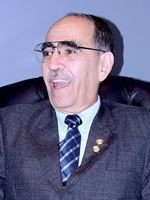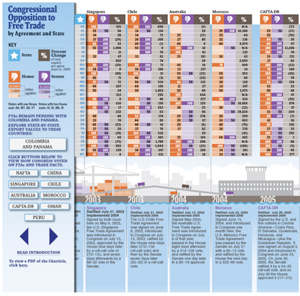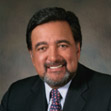Americas Quarterly | USMCA Disputes Left on Back Seat at ‘Three Amigos’ Summit
/For the tenth time since 2005, another North American Leaders’ Summit has come and gone and, with it, questions about how much progress was made on goals set at the last one. U.S. President Joe Biden and Canadian Prime Minister Justin Trudeau bid adiós to their host and Mexican counterpart Andrés Manuel López Obrador with a freshly inked trilateral declaration in hand, spurring questions about whether the three governments can make good on new pledges by the next Summit. Pundits will point out which lofty goals were raised (climate change, migration, supply chains) and which ones took a backseat (U.S.-Canadian concerns over Mexico’s statist energy policy).
As is often the case with global summits, events surrounding the leaders’ January 9–10 head-to-head in Mexico City drew as many headlines as the forum itself. Biden, under pressure to address record-breaking migrant apprehensions at the U.S.-Mexico border, made a stop in the border region for the first time as president on his way to Mexico after announcing new immigration measures that simultaneously limit and create new paths for migration from Cuba, Haiti, Nicaragua and Venezuela. On top of that, three years after they let him go free, Mexican authorities arrested the Sinaloa Cartel’s Ovidio Guzmán, son of infamous cartel leader Joaquín “El Chapo” Guzmán, three days ahead of Biden’s arrival. The arrest, which sparked gun battles and lockdowns, took place after the DEA released stark figures saying it had seized enough lethal fentanyl doses in 2022 to “kill every American” while identifying the Sinaloa Cartel as a number one target in its battle against the synthetic opioid. In Mexico, meanwhile, much was made of the fact that Biden had switched his arrival to a newly renovated airport seen as a cornerstone project of the López Obrador government but frequently lambasted by critics for lackluster transportation options and a dearth of flights.
But one moment from the meetings did raise many an eyebrow. “The time has come to end [U.S.] forgetfulness, abandonment, and disdain toward Latin America and the Caribbean,” López Obrador, often called AMLO, told Biden ahead of the two leaders’ January 9 meeting.
Read More
 Appointed last month as the new Salvadoran ambassador in Washington, Rubén Zamora spoke with AS/COA Online’s Carin Zissis about the evolution of U.S.-Central American security policy in light of President Barack Obama’s recent trip to the region, saying: “Now the Obama administration is moving towards a more comprehensive approach, using the mantra, I would say, of partnership.” The ambassador also gave an overview of the Salvadoran government’s local strategies to drive down crime, as well as how to leverage initiatives such as the Partnership for Growth and CAFTA-DR. With a political career dating back to 1970, Zamora served twice as a legislative deputy in El Salvador’s National Assembly, was a member of the country’s Peace Commission, and ran, in 1994, as the first presidential candidate of the left’s coalition after the 1992 Peace Accords. More recently, he held the post of ambassador to India.
Appointed last month as the new Salvadoran ambassador in Washington, Rubén Zamora spoke with AS/COA Online’s Carin Zissis about the evolution of U.S.-Central American security policy in light of President Barack Obama’s recent trip to the region, saying: “Now the Obama administration is moving towards a more comprehensive approach, using the mantra, I would say, of partnership.” The ambassador also gave an overview of the Salvadoran government’s local strategies to drive down crime, as well as how to leverage initiatives such as the Partnership for Growth and CAFTA-DR. With a political career dating back to 1970, Zamora served twice as a legislative deputy in El Salvador’s National Assembly, was a member of the country’s Peace Commission, and ran, in 1994, as the first presidential candidate of the left’s coalition after the 1992 Peace Accords. More recently, he held the post of ambassador to India.
